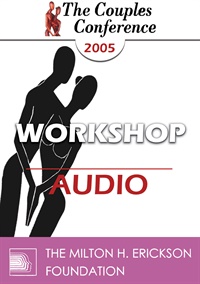
- Average Rating:
- Not yet rated
- Topic Areas:
- Workshops | Belief Systems | Couples Therapy | Relationships
- Categories:
- Couples Conference | Couples Conference 2005
- Faculty:
- Peggy Papp, ACSW
- Duration:
- 2:00:56
- Format:
- Audio Only
- Original Program Date:
- Mar 05, 2005
- Short Description:
- Therapists sometimes get stuck trying to change a couple's interactional patterns without understanding the underlying belief systems that maintain the patterns. By zeroing in on the core beliefs and expectations of each partner, the therapist is able to address multiple levels of experience and help the couple change pivotal aspects of their relationship in a short period of time. Conflicting beliefs around money, sex, power, gender, responsibility and intimacy will be examined within this therapeutic framework.
- Price:
- $15.00 - Base Price
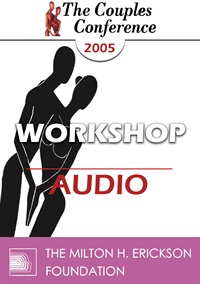
- Average Rating:
- Not yet rated
- Topic Areas:
- Workshops | Attachment | Couples Therapy
- Categories:
- Couples Conference | Couples Conference 2005
- Faculty:
- Sue Johnson, EdD
- Duration:
- 1:56:15
- Format:
- Audio Only
- Original Program Date:
- Mar 05, 2005
- Short Description:
- CC05 Workshop 10 - Attachment Theory: A Map for Couples Therapy - Susan Johnson, EdD
- Price:
- $15.00 - Base Price
Tags: Attachment Couples Therapy
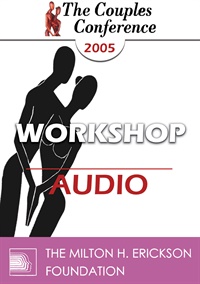
- Average Rating:
- Not yet rated
- Topic Areas:
- Workshops | Couples Therapy | Developmental Therapy Model | Confrontation
- Categories:
- Couples Conference | Couples Conference 2005
- Faculty:
- Ellyn Bader, PhD
- Duration:
- 1:28:23
- Format:
- Audio Only
- Original Program Date:
- Mar 05, 2005
- Short Description:
- CC05 Workshop 11 - High Impact Couples Therapy: A Developmental Model to Start and Sustain Effective Treatment and Confrontation with Difficult Couples - Part II - Ellyn Bader, PhD
- Price:
- $15.00 - Base Price
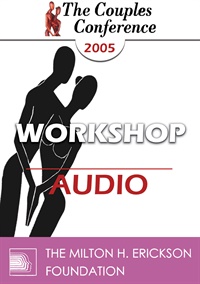
- Average Rating:
- Not yet rated
- Topic Areas:
- Workshops | Couples Therapy | Metaphors | Art and Creativity
- Categories:
- Couples Conference | Couples Conference 2005
- Faculty:
- Peggy Papp, ACSW
- Duration:
- 1:52:55
- Format:
- Audio Only
- Original Program Date:
- Mar 05, 2005
- Short Description:
- CC05 Workshop 12 - Developing Creative Solutions - Peggy Papp, ACSW
- Price:
- $15.00 - Base Price
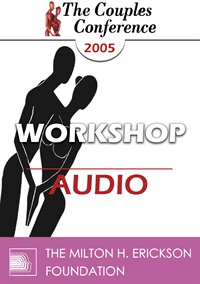
- Average Rating:
- Not yet rated
- Topic Areas:
- Workshops | Cognitive Behavior Therapy (CBT) | Couples Therapy
- Categories:
- Couples Conference | Couples Conference 2005
- Faculty:
- Frank Dattilio, PhD, ABPP
- Duration:
- 2:07:46
- Format:
- Audio Only
- Original Program Date:
- Mar 06, 2005
- Short Description:
- This workshop focuses on the specific use of cognitive-behavioral strategies as an adjunct to the many treatment modalities of couples therapy. It offers a basic overview of the theories of cognitive-behavioral therapy, particularly as it applies to couples. Participants will learn first-hand techniques and strategies for working with difficult couples and how to integrate these strategies with their respective modes of treatment. The presentation is followed by a videotape showing how to implement techniques.
- Price:
- $15.00 - Base Price
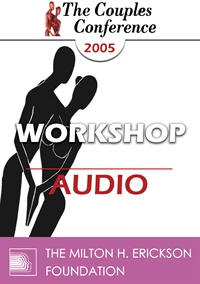
- Average Rating:
- Not yet rated
- Topic Areas:
- Workshops | Couples Therapy | Emotionally Focused Therapy (EFT)
- Categories:
- Couples Conference | Couples Conference 2005
- Faculty:
- Sue Johnson, EdD
- Duration:
- 1:52:52
- Format:
- Audio Only
- Original Program Date:
- Mar 06, 2005
- Short Description:
- This workshop will outline the EFT model of intervention while focusing on the key elements of competent practice and the challenges identified in EFT practice.
- Price:
- $15.00 - Base Price
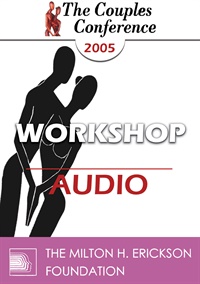
- Average Rating:
- Not yet rated
- Topic Areas:
- Workshops | Couples Therapy | Hypnosis | Sex and Sexuality | Ericksonian Hypnosis and Therapy Techniques
- Categories:
- Couples Conference | Couples Conference 2005
- Faculty:
- Jeffrey Zeig, PhD
- Duration:
- 1:47:54
- Format:
- Audio Only
- Original Program Date:
- Mar 06, 2005
- Short Description:
- Covered in this workshop will be an overview of issues in sex counseling; demographic information; issues in assessment; a phenomenological model; Ericksonian assumptions; and couples exercises for enhancing intimacy.
- Price:
- $15.00 - Base Price
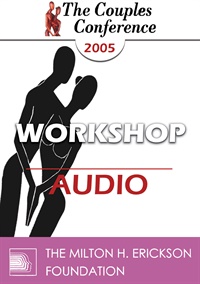
- Average Rating:
- Not yet rated
- Topic Areas:
- Workshops | Couples Therapy | Sex and Sexuality
- Categories:
- Couples Conference | Couples Conference 2005
- Faculty:
- Pat Love, EdD
- Duration:
- 2:31:15
- Format:
- Audio Only
- Original Program Date:
- Mar 06, 2005
- Short Description:
- This workshop will address the three most common sexual issues in therapy - desire discrepancy, low sexual desire and lack of sexual attraction. Physiological as well as psychological dimensions will be explored using current research and clinical applications.
- Price:
- $15.00 - Base Price
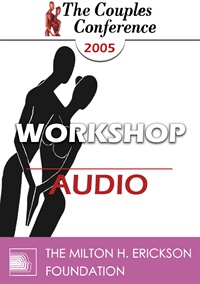
- Average Rating:
- Not yet rated
- Topic Areas:
- Workshops | Cognitive Behavior Therapy (CBT) | Couples Therapy | Family Therapy
- Categories:
- Couples Conference | Couples Conference 2005
- Faculty:
- Frank Dattilio, PhD, ABPP
- Duration:
- 2:39:29
- Format:
- Audio Only
- Original Program Date:
- Mar 06, 2005
- Short Description:
- This workshop focuses on the specific use of cognitive-behavioral strategies as an adjunct to the many treatment modalities of family therapy. It offers a basic overview of the theories of cognitive-behavioral therapy, particularly as it applies to families. Participants will learn first-hand techniques and strategies for working with difficult families and how to integrate these strategies with their respective modes of treatment. Role-playing and case reviews will be used. A question and answer period will follow.
- Price:
- $15.00 - Base Price
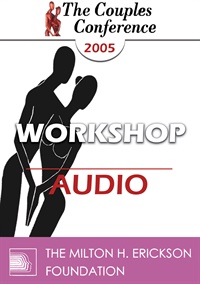
- Average Rating:
- Not yet rated
- Topic Areas:
- Workshops | Couples Therapy | Hypnosis | Sex and Sexuality | Ericksonian Hypnosis and Therapy Techniques
- Categories:
- Couples Conference | Couples Conference 2005
- Faculty:
- Jeffrey Zeig, PhD
- Duration:
- 2:38:21
- Format:
- Audio Only
- Original Program Date:
- Mar 06, 2005
- Short Description:
- Continuing from the morning program, covered in this workshop are principles for using hypnosis; advantages of hypnosis in sex counseling; experiential methods; induction approaches for hypnosis and sex therapy; and Erickson cases.
- Price:
- $15.00 - Base Price
Please wait ...

